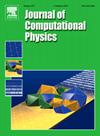基于神经科学的深度神经算子的无分布不确定性量化
IF 3.8
2区 物理与天体物理
Q2 COMPUTER SCIENCE, INTERDISCIPLINARY APPLICATIONS
引用次数: 0
摘要
节能的深度学习算法对于可持续的未来和可行的边缘计算设置至关重要。受神经科学启发的脉冲神经网络(snn)是朝着实现所需能源效率方向迈出的积极一步。然而,为了降低能量需求,精度被略微牺牲了。因此,量化这些模型中的不确定性变得很重要,这些不确定性来自有限的和有噪声的数据、代理梯度和训练过程中遇到的非凸优化。为了应对这一挑战,我们引入了共形随机先验算子(CRP-O)框架,该框架利用随机先验(RP)网络和分裂共形预测(SCP)来量化传统和尖峰神经算子的不确定性。为了进一步实现零镜头超分辨率,我们提出了一个包含高斯过程回归的扩展。这种增强的超分辨率CRP-O框架与最近开发的可变尖峰小波神经算子(VSWNO)集成在一起。为了测试所获得的校准不确定性边界的性能,我们讨论了四个不同的基准示例,涵盖一维和二维偏微分方程。结果表明,与普通RP-VSWNO、分位数WNO (Q-WNO)和共形分位数WNO (CQ-WNO)相比,共形RP-VSWNO产生的不确定性边界显著提高了不确定性估计。这些发现强调了所提出的方法在实际应用中的潜力。本文章由计算机程序翻译,如有差异,请以英文原文为准。
Distribution free uncertainty quantification for neuroscience-inspired deep neural operators
Energy-efficient deep learning algorithms are essential for a sustainable future and feasible edge computing setups. Spiking neural networks (SNNs), inspired from neuroscience, are a positive step in the direction of achieving the required energy efficiency. However, in a bid to lower the energy requirements, accuracy is marginally sacrificed. Hence, it becomes important to quantify the uncertainties in such models originating from limited and noisy data, surrogate gradients, and non-convex optimization encountered during training. In response to this challenge, we introduce the Conformalized Randomized Prior Operator (CRP-O) framework that leverages Randomized Prior (RP) networks and Split Conformal Prediction (SCP) to quantify uncertainties in both conventional and spiking neural operators. To further enable zero-shot super-resolution, we propose an extension incorporating Gaussian Process Regression. This enhanced super-resolution-enabled CRP-O framework is integrated with the recently developed Variable Spiking Wavelet Neural Operator (VSWNO). To test the performance of the obtained calibrated uncertainty bounds, we discuss four different benchmark examples covering both one-dimensional and two-dimensional partial differential equations. Results demonstrate that the uncertainty bounds produced by the conformalized RP-VSWNO significantly enhance the uncertainty estimates compared to vanilla RP-VSWNO, Quantile WNO (Q-WNO), and Conformalized Quantile WNO (CQ-WNO). These findings underscore the potential of the proposed approach for practical applications.
求助全文
通过发布文献求助,成功后即可免费获取论文全文。
去求助
来源期刊

Journal of Computational Physics
物理-计算机:跨学科应用
CiteScore
7.60
自引率
14.60%
发文量
763
审稿时长
5.8 months
期刊介绍:
Journal of Computational Physics thoroughly treats the computational aspects of physical problems, presenting techniques for the numerical solution of mathematical equations arising in all areas of physics. The journal seeks to emphasize methods that cross disciplinary boundaries.
The Journal of Computational Physics also publishes short notes of 4 pages or less (including figures, tables, and references but excluding title pages). Letters to the Editor commenting on articles already published in this Journal will also be considered. Neither notes nor letters should have an abstract.
 求助内容:
求助内容: 应助结果提醒方式:
应助结果提醒方式:


